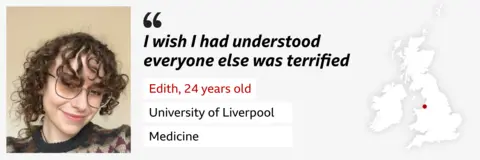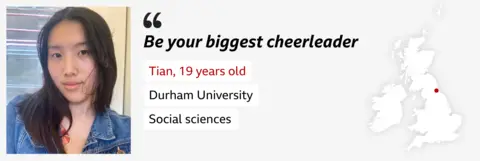Education
Kent and Greenwich universities to merge in attempt to improve financial viability | Higher education

The universities of Kent and Greenwich are set to merge in an attempt to improve their financial viability against a backdrop of economic turmoil across higher education in the UK.
Under the proposed name of London and South East University Group, the single institution will have one vice-chancellor from the academic year starting in autumn 2026. The two universities combined will have 28,000 first degree undergraduates, according to the Higher Education Statistics Agency.
The universities said the combined institution would provide a stronger financial foundation to overcome the economic challenges facing universities now and in the future.
The Office for Students (OfS), England’s higher education regulator,welcomed the move and suggested that more universities may explore similar options as their income has fallen for the third year in a row.
This is due to falls in international students after immigration and visa changes as well as the declining real-terms value of the tuition fee paid by UK students, with the result that 40% of English universities are now believed to be in financial deficit.
The Department for Education (DfE) said ministers “welcome innovative approaches such as this one”.
The vice-chancellors of both universities told the BBC that the move was not a takeover by either institution, although they added that the new university model would be “resilient and financially viable”.
The new university will operate across the existing campuses, including in Medway, where students from both Greenwich and Kent already share the library and other facilities.
Kent has one other campus, in Canterbury, about 48km from Medway, while Greenwich has two other campuses, one on the banks of the River Thames in Greenwich – itself about 45km from Medway – and the other in Avery Hill, south-east London, about 38km away.
Many institutions have been trying to repair budget deficits by slashing building and maintenance spending as well as cutting courses and staff, with the sector expected to sell off more than £400m worth of land and property this year.
Prof Georgina Randsley de Moura will remain the interim leader of Kent until the merger, when Prof Jane Harrington, who runs Greenwich, will become the vice-chancellor of the new institution.
Prof Randsley de Moura said the “trailblazing model” would enable the universities within the new group to retain their name, identity and campuses.
Students will be unaffected by the change, with applications continuing as normal to each institution and degrees awarded in the name of Kent or Greenwich.
Prof Harrington said the universities had worked together on the Medway campus for 20 years and now wanted to contribute more to the economy across London and the south-east.
She added that students would “absolutely categorically” be able to complete any course they are already enrolled on, including those starting university this autumn.
The universities said there are no immediate plans for job losses. Prof Harrington said that costs would be saved by reducing senior roles.
In May, Greenwich confirmed it was cutting the equivalent of 15 full-time posts by August. Kent has already started winding down some courses to reduce costs after posting a deficit for another year in 2024.
Across England, job losses at many institutions over the last couple of years have been mounting, with the University and College Union (UCU) estimating the overall number of posts cut at about 5,000.
Mergers were previously rare but have now become more common, with City St George’s created from two separate University of London universities last year, although most others have involved smaller or specialist institutions.
The OfS chair, Edward Peck, said: “The OfS’s financial sustainability analysis has starkly demonstrated the challenges facing the sector. More universities taking steps to ensure their long-term financial future will likely explore the possibility of working more closely with partners, up to and including mergers. While the OfS will consider any regulatory decisions in this case carefully and on their merits, these initial proposals are to be welcomed.”
A Department for Education spokesperson said: “This collaboration shows how strong partnerships in higher education can help enable delivery of world-class teaching and research while maintaining the best interests of students.
“Through our Plan for Change we are committed to fixing the foundations of higher education, and we will soon publish our plans for HE reform as part of the post-16 education and skills strategy white paper.”
Education
What I wish I knew before going to university

 BBC
BBCOver the next couple of weeks, hundreds of thousands of new students will descend on universities around the country.
For many, this will mark the start of a brand new adventure – though one often filled with a lot of worry.
To help with nerves, BBC News asked for tips from 2024’s first-years, who’ve already sussed out being freshers.
From balancing studies and social life, to looking after your mental health and the importance of doing the washing up, this is what the class of 2024 have to say to the new kids on the block.

Edith Adam says she was “terrified” when she moved to Liverpool last year to study medicine.
What she hadn’t realised at the time was that other freshers were just as scared as she was.
“I was absolutely terrified about not being able to make friends or that people wouldn’t like me,” says Edith, who’s now going into her second year.
“I wish I had understood everyone else was terrified, and that they appreciate it when you go up to them and say hi.”
 Edith Adam
Edith AdamHaving never been to Liverpool before – a city with a party reputation – Edith worried she might not fit in.
“I was really scared of being ostracised for not wanting to go clubbing every night and not being a drinker,” she says.
But Edith was still able to find her people.
“No one actually cares. There are plenty of things you can do that don’t revolve around late nights. Just find what works for you.”
 Edith Adam
Edith AdamThe 24-year-old, from Huddersfield, says her advice would be not to put too much importance on the infamous freshers’ week.
“I think everyone goes in with the expectation that it’s this amazing, wild week, where you meet your best friends for life and have your best time at uni,” she says.
And her top tip for staying friends with your flatmates?
“If it takes less than two minutes, just do it,” Edith says. “It’s so easy for everything to pile up, and then you don’t wash your plates for five days, and all of a sudden everything is dirty and you have no cutlery – and your flatmates hate you.”

But what if you can’t make freshers week?
This is the situation Konstantin Schmidt faced last year, after issues with his visa delayed his start at Greenwich University by five weeks.
Although people told him the freshers parties he’d missed out on were “fun”, the mechanical engineering student says he still managed to settle in well by joining up to student clubs.
“Societies are the best way to find people who share the same passion,” Konstantin says.
 Konstantin Schmidt
Konstantin SchmidtJoining both a volleyball society and the Formula One society, he says he had positive interactions right from the off.
“The second I joined the room the members saw I was new and instantly included me,” Konstantin says. “I also met new people through volleyball who were on my course who quickly became my friends.”
 Konstantin Schmidt
Konstantin SchmidtThe 21-year-old bonded with his flatmates by exploring each other’s culture through food and music.
In his first weeks, Konstantin, who’s from Bavaria in Germany, made Spätzle – a pasta dish topped with grilled cheese for a dinner party with his flatmates.
“Everyone really liked” his food, he says – but he admits the best dish was a Filipino one made by his flatmate, Kai.
“It helped us understand everyone’s culture even better,” Konstantin says.

While many people starting university will be living away for the first time, some students still live at home.
Commuting more than an hour each way between Glasgow and Edinburgh, Rebecca can relate.
“If they forget something, my friends can just nip back to their accommodation, whereas I can’t, ” she says. “But it’s not bad, I like commuting in.”
Going into her second year of a business management course, Rebecca is now much more organised and comfortable with the journey, after experiencing some hiccups in her first year.
 Handout
HandoutIn some cases, cancelled trains meant she had to pay for a taxi all the way to Edinburgh.
“In second year I will definitely be checking my trains,” Rebecca says.
Her advice for freshers is simple: “Make sure your bag is fully packed with everything you might need – and plan your commute.”
Rebecca’s university experience has been different from many others as she was only 16 when she started her course.
“I thought everyone was going to be older and not want to speak to me,” she says. “But it wasn’t like that at all. The age gap doesn’t really matter.”
 Handout
HandoutNow 17, Rebecca is still waiting to experience a full freshers’ week, but says she was still able to attend under-18 events.
Her advice for those in a similar position?
“Don’t be afraid to ask for help,” she says. “I felt like I couldn’t ask for help because people would think I didn’t deserve to be there because I’m younger.
“They don’t care that you’re 16 or 17. Just ask for help.”

As the first in her family to go to university, Tian Liu didn’t know what to expect before she started her combined honours degree in social sciences.
“I did so much research, but I still felt so unprepared,” Tian says. “University is definitely a roller coaster. There was a point I wanted to drop out, but now I can definitely see the fruits of my labour.”
 Tian Liu
Tian LiuNow going into her second year, the 19-year-old has found a better balance and would advise incoming students to look after their mental health.
“With tuition fees rising there is such a pressure to make the most out of it, but you can burn out,” Tian says. “University is as much as you make of it, but give yourself grace.
“Have close friends who can act as support and accountability if you are doing too much, and use pastoral teams that the university offers,” she adds.
“There is no need to rush, it’s all a constant learning curve.”
 Tian Liu
Tian LiuOne year on from moving to Durham from Leeds, Tian is in New York completing an internship she got through her university – something she “could never have imagined” last year.
Her advice for incoming students?
“Don’t disqualify yourself from anything. Be your biggest cheerleader. And take so many photos.”
Education
Franklin County Schools considering AI gun detection software

FRANKLIN COUNTY, Va. – School board members are discussing the use of artificial intelligence to detect guns on school grounds.
Superintendent Dr. Kevin Siers said the board has been exploring options, including software from Zero Eyes that uses existing security cameras and AI to identify firearms and alert an incident center within seconds.
“We take safety and security very serious,” Siers said. “So that caused us to take a deeper look into what options are available for weapons detection.”
Dustin Brooks, a co-founder of Zero Eyes, said the system is designed to be proactive and to prompt an immediate response. He described a process in which a camera detects a gun, an operations center verifies the alert, and then dispatches notifications to the school and local authorities.
“From detection — gun brandished in front of camera, camera picks up gun, operation center verifies alert, dispatch alert, customer receives alert — that process can be, you know, as fast as three to five seconds,” Brooks said.
Brooks said human analysts review any images the AI flags, which he said reduces false alarms. He added that the system is narrowly focused on detecting firearms and does not share other images with the information center.
“We’re looking for guns. The only thing that we’re looking for is guns,” he said.
Siers emphasized the move is to prepare for dangerous incidents before they even happen.
“Our resource officers do a great job of trying to study those incidents when they occur and then trying to apply how the lessons learned there might be applied in our schools,” he said. “So it’s just an ongoing process and, unfortunately, it’s something that too many schools are having to deal with.”
If approved, the technology would be implemented at Franklin County Middle School and Franklin County High School.
Roanoke City and Salem Public Schools are among other districts that have used or are considering similar AI detection software.
Copyright 2025 by WSLS 10 – All rights reserved.
Education
AI and the Future of Learning at the Acropolis

At the foot of the Acropolis in Athens, Demis Hassabis, the CEO of Google’s DeepMind and 2024 Nobel laureate, underscored the imperative skill of learning how to learn in an era dominated by Artificial Intelligence. Addressing attendees at an ancient Roman theatre, Hassabis illuminated the pressing need for adaptability amidst rapid technological evolution.
Hassabis highlighted the future potential of artificial general intelligence, predicting its arrival within a decade. He emphasized the requirement for ‘meta-skills’, such as mastering new disciplines, to complement traditional education in fields like math and science. His remarks reflect the necessity of continual learning to navigate the swiftly changing landscape catalyzed by AI innovations.
Joining the discussion, Greek Prime Minister Kyriakos Mitsotakis warned about the financial inequalities proliferated by burgeoning tech behemoths. He pointed out the potential social unrest stemming from disproportionate wealth generated within a few companies, urging that AI advancements benefit all layers of society.
-

 Business2 weeks ago
Business2 weeks agoThe Guardian view on Trump and the Fed: independence is no substitute for accountability | Editorial
-
Tools & Platforms1 month ago
Building Trust in Military AI Starts with Opening the Black Box – War on the Rocks
-

 Ethics & Policy2 months ago
Ethics & Policy2 months agoSDAIA Supports Saudi Arabia’s Leadership in Shaping Global AI Ethics, Policy, and Research – وكالة الأنباء السعودية
-

 Events & Conferences4 months ago
Events & Conferences4 months agoJourney to 1000 models: Scaling Instagram’s recommendation system
-

 Jobs & Careers2 months ago
Jobs & Careers2 months agoMumbai-based Perplexity Alternative Has 60k+ Users Without Funding
-

 Podcasts & Talks2 months ago
Podcasts & Talks2 months agoHappy 4th of July! 🎆 Made with Veo 3 in Gemini
-

 Education2 months ago
Education2 months agoVEX Robotics launches AI-powered classroom robotics system
-

 Education2 months ago
Education2 months agoMacron says UK and France have duty to tackle illegal migration ‘with humanity, solidarity and firmness’ – UK politics live | Politics
-

 Funding & Business2 months ago
Funding & Business2 months agoKayak and Expedia race to build AI travel agents that turn social posts into itineraries
-

 Podcasts & Talks2 months ago
Podcasts & Talks2 months agoOpenAI 🤝 @teamganassi


